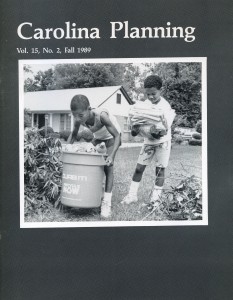 Volume 15.2 Emerging Planning Issues (1989)
Volume 15.2 Emerging Planning Issues (1989)
Human actions-not only in the United States, but around the globe–are steadily degrading the quality of the environment. Relentless urbanization, the proliferation of hazardous waste, and the fall out from “disposable” societies pose increasing threats to the environment worldwide.
In order to address these issues most effectively, planners must expand upon their role as champions of the environment. Planners can start by fostering a change in the public’s attitude toward the environment and the conservation of natural resources. In this regard, a number of strategies hold promise. These strategies include: educating the public about recycling efforts; encouraging the reuse and redevelopment of existing urban areas through the land use planning process; and making the public aware of conservation programs that they can get involved in.
Everyone has a great deal at stake in the impending global environmental crisis. Each citizen, therefore, should be aware of the environmental consequences of daily human activities, and measures that can be taken to mitigate the adverse effects.
Editors: Irving Boykins, Paul M. Kron, Elizabeth Morton, Trina Gauld, Julia Vant-Hull, Sara J. Hendricks, and L. Dale McKeel
A digital version of this issue is available here.
| PEDALING INTO THE FUTURE
Lowe, Marcia The bicycle has the potential to help free cities from choking on pollution and traffic congestion and to offer short range individualized travel at low costs to billions. A growing number of nations are realizing that, in a world of finite resources, the bicycle is the vehicle of the future. |
| PLANNING FOR ENDANGERED SPECIES: ON THE POSSIBILITIES OF SHARING A SMALL PLANET
Beatley, Timothy Beatley poses several arguments for species protection. He discusses the case of the fringe-toed lizard in California to illustrate practical problems of habitat conservation that arise from competing land use interests. Planners can play a vital role in directing strategies to protect critical habitat. |
| AGRICULTURAL COLONIZATION AND THE SOCIAL DIMENSION OF ECOLOGICAL DESTRUCTION IN ECUADOR’S AMAZONIA
Pichon, Francisco This article examines the relationship between small holder agriculture and ecological destruction in Ecuador’s Amazonia. Poverty, unequal land distribution, low productivity, and misguided government policies all cause deforestation. Economic incentives must be changed to prevent further deforestation. |
| THE IMPACT OF ENVIRONMENTAL LIABILITY ON LAND USE PLANNING
Buckley, John The threat of environmental liability discourages the resale and reuse of industrial and commercial property. This article discusses the source of environmental liability and reviews its effects on purchasers, lenders, and insurers. Planners must understand the pervasive and potentially devastating impacts on developed and virgin land. |